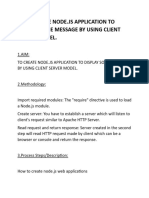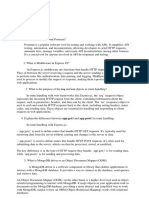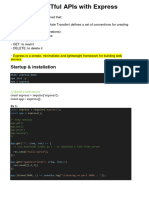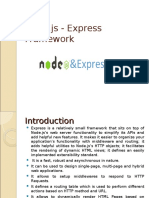0% found this document useful (0 votes)
6 views30 pagesAllnode
The document outlines multiple Node.js applications using Express and other libraries. It includes creating a simple HTTP server, handling file uploads, integrating EventEmitter, connecting to a PostgreSQL database for CRUD operations, serving downloadable files, handling JSON data, and building a REST API for articles. Each section provides code snippets and explanations for the functionalities implemented.
Uploaded by
shettyyashwin569Copyright
© © All Rights Reserved
We take content rights seriously. If you suspect this is your content, claim it here.
Available Formats
Download as DOCX, PDF, TXT or read online on Scribd
0% found this document useful (0 votes)
6 views30 pagesAllnode
The document outlines multiple Node.js applications using Express and other libraries. It includes creating a simple HTTP server, handling file uploads, integrating EventEmitter, connecting to a PostgreSQL database for CRUD operations, serving downloadable files, handling JSON data, and building a REST API for articles. Each section provides code snippets and explanations for the functionalities implemented.
Uploaded by
shettyyashwin569Copyright
© © All Rights Reserved
We take content rights seriously. If you suspect this is your content, claim it here.
Available Formats
Download as DOCX, PDF, TXT or read online on Scribd
/ 30























































































